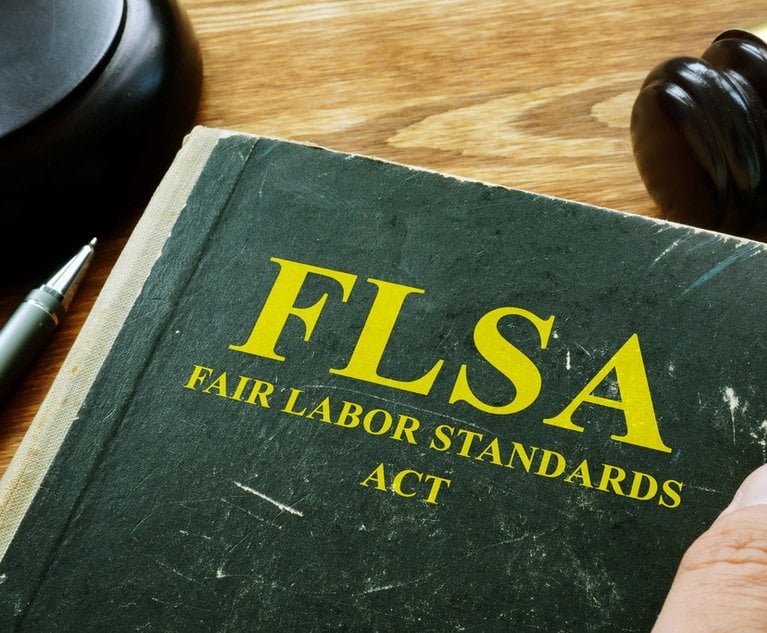 Andrea M. Kirshenbaum of Post and Schell
Andrea M. Kirshenbaum of Post and Schell Risk Factors Combine to Make Wage-and-Hour Audits a Priority for Employers in 2022
Prudent employers are examining both Heimbach and employee pay practices to assess their wage-and-hour risk via wage-and-hour audits. These audits look at employer pay practices, worker classifications, and remote work policies, among other areas, to identify potential noncompliance, make any required modifications and potentially avoid costly litigation.
December 17, 2021 at 12:07 PM
9 minute read
By Andrea M. Kirshenbaum
As 2021 draws to a close, many employers are looking ahead to 2022 and hoping to reduce legal risk in the new year. Yet, pay practices put in place for nonexempt employees during the pandemic combined with the Pennsylvania Supreme Court's decision in July in Heimbach v. Amazon.com have created a perfect storm of wage-and-hour risk for Pennsylvania employers.
Prudent employers are examining both Heimbach and employee pay practices to assess their wage-and-hour risk via wage-and-hour audits. These audits look at employer pay practices, worker classifications, and remote work policies, among other areas, to identify potential noncompliance, make any required modifications and potentially avoid costly litigation.
- Heimbach Expansively Interprets the Pennsylvania Minimum Wage Act
In Heimbach, the Pennsylvania Supreme Court held that time spent by nonexempt employees on an employer's premises waiting to undergo, and undergoing, mandatory security screening, was compensable under the Pennsylvania Minimum Wage Act (PMWA). The U.S. Supreme Court had found the exact same time not compensable under the federal Fair Labor Standards Act (FLSA) in 2014 in Integrity Staffing v. Busk. The Heimbach court also held that the FLSA's de minimis doctrine, which excludes from compensable time "insubstantial and insignificant periods," does not apply to bar claims for negligible or insignificant amounts of time worked under the PMWA.
This content has been archived. It is available through our partners, LexisNexis® and Bloomberg Law.
To view this content, please continue to their sites.
Not a Lexis Subscriber?
Subscribe Now
Not a Bloomberg Law Subscriber?
Subscribe Now
NOT FOR REPRINT
© 2025 ALM Global, LLC, All Rights Reserved. Request academic re-use from www.copyright.com. All other uses, submit a request to [email protected]. For more information visit Asset & Logo Licensing.
You Might Like
View All
Third Circuit's 'Johnson v. NCAA' Opinion: What It Means for College Athletics and Beyond
6 minute read
'Utterly Bewildering': GCs Struggle to Grasp Scattershot Nature of Law Firm Rate Hikes

Health Care Worker Files Class Action Against Staffing Agency for Unpaid Meal Breaks
4 minute readLaw Firms Mentioned
Trending Stories
Who Got The Work
J. Brugh Lower of Gibbons has entered an appearance for industrial equipment supplier Devco Corporation in a pending trademark infringement lawsuit. The suit, accusing the defendant of selling knock-off Graco products, was filed Dec. 18 in New Jersey District Court by Rivkin Radler on behalf of Graco Inc. and Graco Minnesota. The case, assigned to U.S. District Judge Zahid N. Quraishi, is 3:24-cv-11294, Graco Inc. et al v. Devco Corporation.
Who Got The Work
Rebecca Maller-Stein and Kent A. Yalowitz of Arnold & Porter Kaye Scholer have entered their appearances for Hanaco Venture Capital and its executives, Lior Prosor and David Frankel, in a pending securities lawsuit. The action, filed on Dec. 24 in New York Southern District Court by Zell, Aron & Co. on behalf of Goldeneye Advisors, accuses the defendants of negligently and fraudulently managing the plaintiff's $1 million investment. The case, assigned to U.S. District Judge Vernon S. Broderick, is 1:24-cv-09918, Goldeneye Advisors, LLC v. Hanaco Venture Capital, Ltd. et al.
Who Got The Work
Attorneys from A&O Shearman has stepped in as defense counsel for Toronto-Dominion Bank and other defendants in a pending securities class action. The suit, filed Dec. 11 in New York Southern District Court by Bleichmar Fonti & Auld, accuses the defendants of concealing the bank's 'pervasive' deficiencies in regards to its compliance with the Bank Secrecy Act and the quality of its anti-money laundering controls. The case, assigned to U.S. District Judge Arun Subramanian, is 1:24-cv-09445, Gonzalez v. The Toronto-Dominion Bank et al.
Who Got The Work
Crown Castle International, a Pennsylvania company providing shared communications infrastructure, has turned to Luke D. Wolf of Gordon Rees Scully Mansukhani to fend off a pending breach-of-contract lawsuit. The court action, filed Nov. 25 in Michigan Eastern District Court by Hooper Hathaway PC on behalf of The Town Residences LLC, accuses Crown Castle of failing to transfer approximately $30,000 in utility payments from T-Mobile in breach of a roof-top lease and assignment agreement. The case, assigned to U.S. District Judge Susan K. Declercq, is 2:24-cv-13131, The Town Residences LLC v. T-Mobile US, Inc. et al.
Who Got The Work
Wilfred P. Coronato and Daniel M. Schwartz of McCarter & English have stepped in as defense counsel to Electrolux Home Products Inc. in a pending product liability lawsuit. The court action, filed Nov. 26 in New York Eastern District Court by Poulos Lopiccolo PC and Nagel Rice LLP on behalf of David Stern, alleges that the defendant's refrigerators’ drawers and shelving repeatedly break and fall apart within months after purchase. The case, assigned to U.S. District Judge Joan M. Azrack, is 2:24-cv-08204, Stern v. Electrolux Home Products, Inc.
Featured Firms
Law Offices of Gary Martin Hays & Associates, P.C.
(470) 294-1674
Law Offices of Mark E. Salomone
(857) 444-6468
Smith & Hassler
(713) 739-1250






